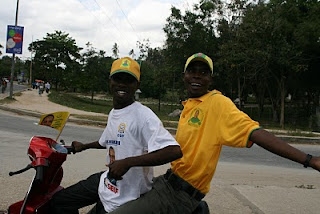Victorious Isles Hold Post-Election Rallies
Zanzibar — JUBILANT CUF fans turned-up in big numbers at public rallies on the Isles, organized to thank the electorate for participating peacefully in the October 31 elections.
Addressing both rallies, First Vice President Mr Seif Shariff Hamad who is also CUF Secretary General underlined unity and hard work, saying cooperation at top leadership was strong.
He also asked CUF members to start preparing for the next elections (2015).
"President Ali Mohamed Shein, Second VP Ambassador Seif Ali Iddi and I, have forged a strong bond, definitely because we conducted decent election campaigns.
We are committed to working together for the interest of Zanzibar," Mr Hamad said.
There would be no room for saboteurs and ministers and legislators should show commitment to serve Zanzibaris, he said, citing intervention to halt dumping of substandard foods (such as Mapembe rice) into Zanzibar market.
The public rallies are the first to be held after the general election. Earlier, the Minister of State- First President's office Ms Fatma Abdulhabib Fereji, introduced her colleagues (ministers) from CUF.
At a rally held at Tibirinzi ground in Chake-chake Pemba, the South Pemba Regional Commissioner Mr Kasim Tindwa said ministers should work hard for development.
A minister from CCM, Mr Hajo Omar Kheri (state minister- civil service and good governance) also attended the rally.
Mr Abubakari Khamis Bakari (Constitution and Legal Affairs), Mr Nassor Mazrui (Trade and Marketing) and Mr Hamad Masoud ( Infrastructure and Communication) attended the rally held at Kibanda Maiti.
"We thank you and pray that team work remains stronger for the development of Zanzibar," said Mr Khalifa Abdallah, CUF national youth secretary.
"CUF members and fans support the GNU. Since elections are over, we need now to start preparing ourselves for the 2015 general elections," he said.
A rally held in Pemba carried a similar message delivered by Mr Saleh Nassor Juma, the Island's CUF youth leader.
Meanwhile local government elections in nine wards of Unguja and Pemba were held peacefully on Sunday as confirmed by voters and Zanzibar Electoral Commission (ZEC) staff at the polling stations.





























